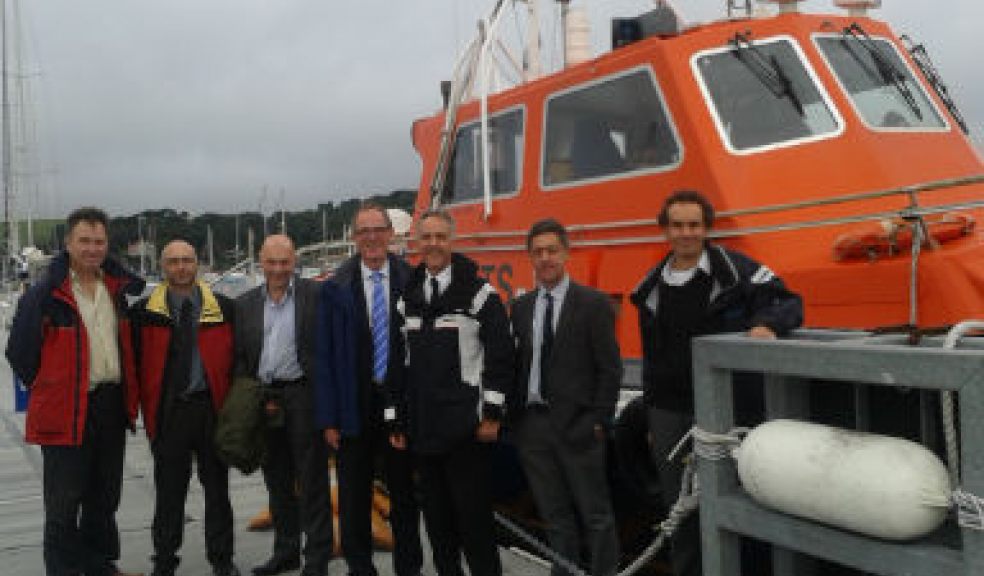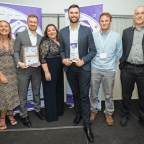
Exeter Impact Awards Focus: FaB Test
Led by Dr Lars Johanning with support from Project partners: Falmouth Harbour Commissioners, A&P Group, Cornwall Marine Network, and Mojo Maritime; the Falmouth Bay Test Site (FaB Test) is helping to accelerate the commercial hydroelectrity devices by providing a low cost and easily accessible test site for the marine energy sector.
At a site operated by Falmouth Harbour Commissioners and the University of Exeter. The FaB test was conceived and developed with the support of Cornish businesses working in the marine energy sector including A&P Group (Falmouth), Cornwall Marine Network and Mojo Maritime Ltd.
It is the only marine test site which has seen any long term continuous testing of prototype hydro-electricty devices.
Falmouth Bay Test Site for marine renewable energy (FaB Test) is a pioneering facility created to give device developers access to a pre-licensed and consented area of the sea which is easily accessible and in close proximity to nearby port infrastructure and business support services.
FaB Test allows for up to three devices to be deployed at the same time and therefore provides a fast, flexible low cost solution for the testing of wave energy technologies, components, moorings and deployment procedures.
FaB Test offers water depths of 20m-50m and seabed types; rock, gravel and sand and enables wave energy device developers to test components, concepts or full scale devices in a moderate wave climate.
It is regarded as a significant element of the wider South West’s R&D and innovation support for renewable energy and received recognition of this fact when it won the 2012 South West Green Energy award for best business innovation.
FaB Test was designed to fill a gap in the range of test facilities that the industry felt was needed to accelerate wave energy technologies towards development at a commercial scale. The Cornish LEP has recently granted the University of Exeter funding of over £500K from the Regional Growth Fund so that we can help to help enhance the facility with long term research addressing a demand for comprehensive environmental monitoring and data acquisition capabilities.
FaB Test was conceived by a partnership consisting of Falmouth Harbour Commissioners, Wave Hub, the University of Exeter, A&P Group, Cornwall Marine Network and Mojo Maritime Ltd. The factors that brought the partnership together were:
- the collective desire to see the far South West as a key region for the development of marine energy technologies;
- the opportunity for existing service providers to support FaB Test clients;
- the acknowledged strengths, knowledge and skills of the respective partners in technology services, construction, deployment operation and scientific and engineering services;
- the comprehensive R&D support available through the University which is informing wave energy developers about the environmental impact and the efficiency of their devices;
- the importance of the site in helping provide essential knowledge to developers on device performance and operability – knowledge required to secure future investment into the sector.
FaB Test is operated by FHC and UoE. In April 2012, they welcomed the first wave device to be installed for testing. Fred Olsen Renewable’s BOLT “Lifesaver” wave energy converter is currently still being tested at the site, before potentially being deployed at the grid connected Wave Hub site, off the Cornish coast near Hayle.
Fred Olsen Renewables have therefore been able to run the device on site continuously for over a year collecting data on reliability and performance to inform deployment, operation and maintenance strategies. This is the only example of a full scale wave device undergoing long term testing at sea.
The team is presently assessing enquiries and requests to use the site from other leading wave energy companies so we can expect to see more activity in 2014.
The impact of a fully functional test site at FaB Test will be reflected in the continued growth in local supply chain businesses with expectations of around 100 jobs being created in the next 4 years. Alongside this growth will be the opportunity to provide a platform for device developers to then confidently move to Wave Hub as the final step before realising commercially available wave energy devices.




















